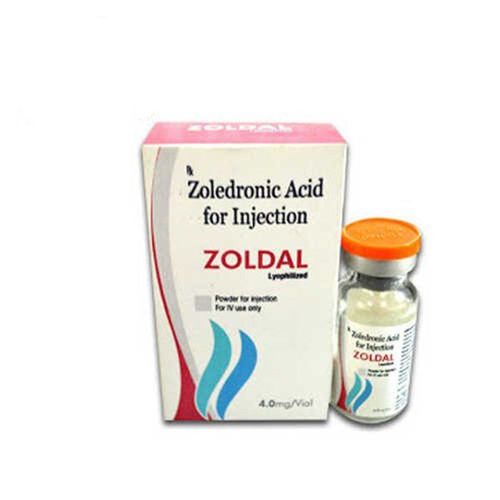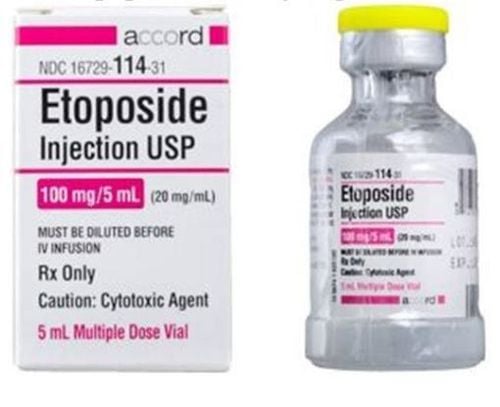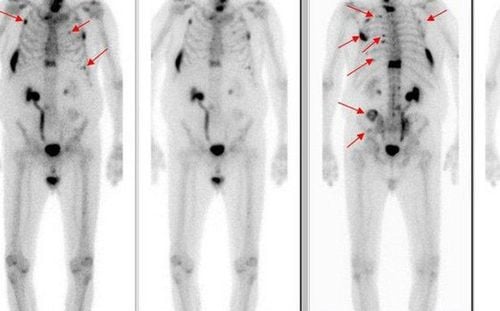This is an automatically translated article.
Article by Specialist Doctor I Nguyen Thi Minh Thuyen - Laboratory Department - Vinmec Danang International Hospital
1. Use of bisphosphonates
Bisphosphonates are drugs that slow down bone-resolving cells (osteoclasts). These cells normally break down the hard mineral structure of the bone. The osteoclasts are often overactive when prostate cancer spreads to the bones and can cause bone problems.
Effects of bisphosphonates:
Help relieve pain and reduce high calcium levels caused by cancer metastases to bones Help slow the growth of cancer metastasized to bones and help delay or prevent fractures Help strengthen bones in you are on hormone therapy Zoledronic acid (Zometa) is a bisphosphonate commonly used for prostate cancer. The drug has the following indications:
Intravenous (IV), 3-4 weeks/time or 12 weeks/time It is recommended that users of this drug take a supplement containing calcium and vitamin D to prevent calcium reduction. Side effects: . Flu-like symptoms and bone or joint pain
. Kidney problems (thus medication should be considered when the patient has poor kidney function)
. A rare but very serious side effect is osteonecrosis of the jaw (ONJ). Part of the jawbone loses its blood supply and dies, which can lead to tooth loss and a jawbone infection that is difficult to treat. Therefore, it is recommended that patients have their oral health checked and if any dental or jaw problems need to be treated before starting bisphosphonate treatment. Good oral hygiene by flossing and brushing, making sure dentures fit properly, and having regular dental exams can also help prevent ONJ.
2. Using denosumab
Denosumab (Xgeva) is another drug that can help when prostate cancer has metastasized to bone. Like bisphosphonates, denosumab also blocks osteoclasts, but by a different mechanism.
How denosumab works:
Helps prevent or delay problems such as fractures in patients who have metastasized bones. Medicine can be helpful even if zometa is not effective Helps strengthen bones in patients on hormone therapy Injections every 4 weeks. People taking this medicine should take a supplement containing calcium and vitamin D to prevent calcium loss Common side effects: -Nausea, diarrhea
-Feeling weak or tired
-May also cause jaw bone necrosis
3. Using corticosteroids
Some studies suggest that corticosteroid drugs (such as prednisone and dexamethasone) can help:
Reduce bone pain Reduce PSA levels
4. External radiation therapy
Radiation therapy can help relieve bone pain, especially if the pain is limited to one or only a few bone areas. Radiation therapy can target tumors on the spine, helping to relieve pressure on the spinal cord and prevent paralysis; shrink tumors in other parts of the body to relieve other symptoms.
5. Using radioactive drugs
Radiopharmaceuticals contain radioactive elements, which are injected intravenously and localized to damaged bone areas, emitting radiation to destroy cancer cells.
The drug is used in cases where the cancer has spread to many bones, because the radiopharmaceutical can reach all the affected bones at once.
Radioactive drugs for prostate cancer that has spread to bone:
Strontium-89 (Metastron) Samarium-153 (Quadramet) Radium-223 (Xofigo) Side effects: decreased blood cell count, possible increases the risk of infection or bleeding.
6. Bone cancer surgery
Kyphoplasty is a minor surgery to stabilize a painful collapsed bone in the spine weakened by prostate cancer.
To perform this minor surgery, the doctor will make a small incision in the middle of the back, place a ball into the weak part of the spine. The balloon is filled with air and then injected with a cement-like mixture (which will harden) to stabilize the bones and spine.
7. Use pain relievers
When prescribed correctly, pain relievers are very effective, especially when taken on a regular schedule. Medicines will not be effective if taken only when the pain has become severe. If you have bone pain from prostate cancer, you must get treatment to relieve the pain, make you feel better, and be able to focus on more important things. Tell your doctor about pain, other symptoms or any quality of life concerns. Now, pain and most other symptoms of prostate cancer can usually be treated. With modern and synchronous automatic and semi-automatic testing equipment of famous brands such as Beckman Coulter, Roche, Thermo, Siemens, Biomeriux... Laboratory Department of Vinmec Danang International General Hospital undertake biochemical tests - immunology, hematology - blood transfusion, microbiology and pathology from basic to advanced and specialized. In particular, the Faculty has a microbiology laboratory that meets the standards of a Level II Biosafety Laboratory with a pressurization system and a HEPA filter system for the entire area of the rooms. The tests at Vinmec Da Nang are performed according to standard procedures, strict quality control, accurate results with fast response time, a reliable basis for doctors to choose treatment regimens. optimal for the patient.
Please dial HOTLINE for more information or register for an appointment HERE. Download MyVinmec app to make appointments faster and to manage your bookings easily.
Article referenced source: American Cancer Society













